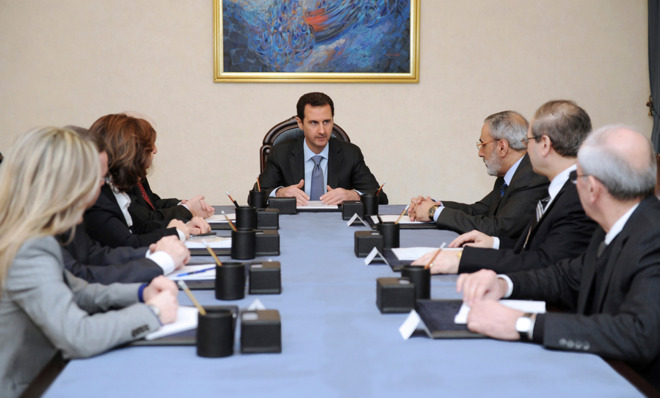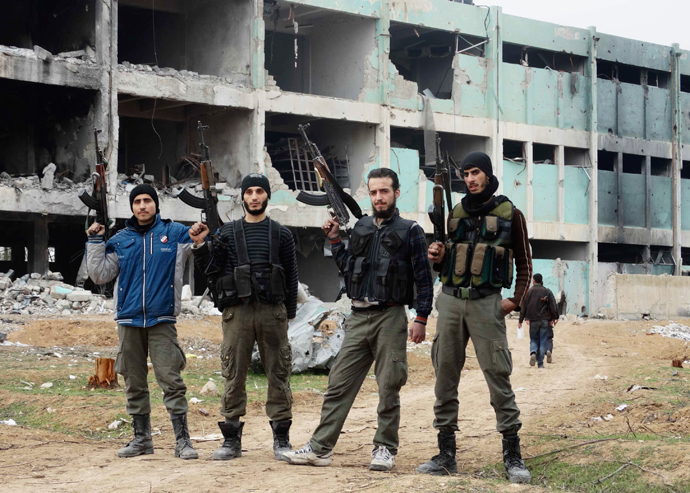4 factors necessary for successful Syrian peace talks
The negotiations in Switzerland are all but doomed. Here's how to do better next time.

A free daily email with the biggest news stories of the day – and the best features from TheWeek.com
You are now subscribed
Your newsletter sign-up was successful
As Syrian peace talks commence today in Montreux, Switzerland, amidst volleys of recriminations from all sides, it's clear that diplomats are not going to emerge from the negotiating table with a plan to bring Syria's three-year-old civil war to a conclusion.
But it has also become increasingly evident that a political solution is the only to way resolve a conflict that has already claimed 100,000 lives. The U.S. and other Western powers, wary of getting bogged down in a Shiite-Sunni power struggle spreading across the Middle East, are unlikely to intervene in any significant manner. Meanwhile, the regime of Syrian President Bashar al-Assad and rebel forces are locked in a grim stalemate that shows no sign of abating.
So what are the conditions necessary for successful peace talks? Here are four:
The Week
Escape your echo chamber. Get the facts behind the news, plus analysis from multiple perspectives.

Sign up for The Week's Free Newsletters
From our morning news briefing to a weekly Good News Newsletter, get the best of The Week delivered directly to your inbox.
From our morning news briefing to a weekly Good News Newsletter, get the best of The Week delivered directly to your inbox.
A united rebel front
It takes two to tango. But the Syrian civil war has become a three-way conflict featuring the regime, the opposition, and Islamic extremists taking advantage of the upheaval to carve out a territory stretching across eastern Syria and western Iraq.
And that's simplifying matters. Two of the main rebel groups, the National Coordination Body (NCB) and the Syrian National Council (SNC), have always been at odds. The NCB has accused the SNC of being a front for the Muslim Brotherhood and Western powers, while the SNC has demonized the NCB for being too moderate in its desired reforms.
The extremists are facing similar rifts. The Islamic State of Iraq and the Levant (ISIS) has had numerous clashes with other al Qaeda affiliates over the past few weeks. The Syrian Observatory for Human Rights claimed that 1,069 people were killed in these clashes between Jan 3. and Jan. 15.
A free daily email with the biggest news stories of the day – and the best features from TheWeek.com
Lakhdar Brahimi, the U.N. peace envoy to Syria, has called for talks that would "bring in two Syrian delegations: One representing the regime and the other the opposition." Clearly, the Syrian war has spiraled into something far more complex.
The first step to peace, then, is for the more moderate rebels to minimize the presence of ISIS and its affiliates, and to form a united front with a cohesive idea of what a post-war Syria should look like.
A will to negotiate
The international community wants negotiations to begin more than the actors in Syria do, which is a sure recipe for failure. The U.S. and the U.K. have threatened to withhold aid from opposition groups, while France, Saudi Arabia, and Turkey have also urged them to come to the negotiating table, albeit without threats. As a result, while the SNC has agreed to attend the talks, the decision was based more on international pressure than out of any true commitment to bringing the war to an end.
Meanwhile, the NCB has decided to boycott the talks. Here's the rub: Appearing to negotiate with Assad hurts the credibility of these rebel groups, particularly with fighters on the ground.
Then there's Assad himself, who has dismissed any talk of forming a transitional administration with his opponents, saying the idea is "totally unrealistic." If peace is to be given a chance, all the actors need to have an incentive for making it happen.

Solving the Iran question
Iran's status as the central base of Shiite power in the Middle East, as well as its role as Assad's most prominent regional ally, means that it must be involved in any Syrian peace agreement. But as the latest brouhaha preceding the talks in Montreux showed, Iran and its opponents aren't even on the same page when it comes to Syria.
Geneva I, the conference held last June, has largely formed the framework for Geneva II, the current round of talks. While 39 of the 40 countries invited have agreed to the preconditions set forth at Geneva I, which bend the talks toward Assad handing over power, Iran has staunchly refused to accept them — at least publicly.
After U.N. Secretary General Ban Ki Moon announced on Sunday that an invitation had been extended to Iran in light of a private assurance by Iranian officials that Iran would agree to the conditions set forth in Geneva I, the U.S., the U.K., and France were quick to assert that Iran should publicly announce its support for the preconditions.
But Iran balked, and Ban on Monday was forced to withdraw Iran's invitation. Ban's spokesperson told The Guardian that "Iran, despite assurances provided orally to the secretary general, has made a disappointing public statement."
No one wins in this situation, since Iran's absence does nothing to mitigate its role in the overall conflict. Syrian negotiations can begin in earnest only after Iran and the international community agree on a framework for peace.
Acts of good faith
In order to reverse some of the mistrust that has become entrenched on both sides, acts of good faith are key. Indeed, NCB executive member Khaled Dahowd told Reuters that the talks "will be over releasing prisoners and getting humanitarian aid, and not over creating a transition to democracy."
The Syrian government announced on Friday that it would be willing to swap prisoners with the opposition groups. The regime also announced that it was willing to "take a series of humanitarian steps" to speed the delivery of aid to those in need. Finally, there has been talk of a possible cease-fire in the embattled city of Aleppo.
But the opposition has been largely quiet on these offers. While there are legitimate concerns that the regime is not being entirely above-board (the cease-fire is reportedly contingent on the evacuation of rebel fighters form Aleppo), it is also apparent that the opposition is unwilling to agree to any terms of compromise before the talks take place — again, out of concern for its credibility with fighters on the ground.
-
 How to Get to Heaven from Belfast: a ‘highly entertaining ride’
How to Get to Heaven from Belfast: a ‘highly entertaining ride’The Week Recommends Mystery-comedy from the creator of Derry Girls should be ‘your new binge-watch’
-
 The 8 best TV shows of the 1960s
The 8 best TV shows of the 1960sThe standout shows of this decade take viewers from outer space to the Wild West
-
 Microdramas are booming
Microdramas are boomingUnder the radar Scroll to watch a whole movie